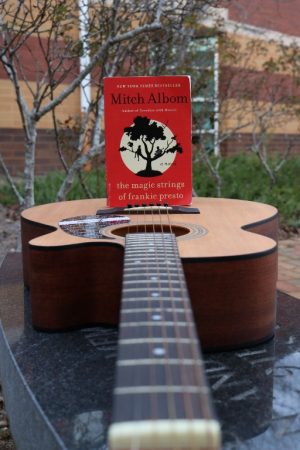Tuning into the facts
The effect of music on productivity and emotion
A student focuses on his work while listening to some of his favorite tunes. Students choose to listen to music while doing schoolwork to lift their mood and help them concentrate.
February 5, 2017
An assignment is handed out to a group of students. As the papers are being passed back, a few of the students dig out a pair of earbuds and connect them to their phone. Music is a nice alternative to the quiet hum of a classroom, but does it actually benefit people in terms of the work they get done? A number of studies have explored the pros and cons of listening to tunes and have discovered that the power of music ranges far beyond background noise.
Music has been proven to both improve and diminish cognitive ability. It all depends on one’s personality and the type of music they’re listening to. According to Arielle S. Dolegui, “a study conducted by Smith and Morris [studied] the effects of sedative and stimulative music.”
Basically, this study proved that those who listened to sedative music proved more productive than those listening to stimulative music, and both groups who listened to music performed worse than those who did not.
Music can perform as a distractor to some students especially if it’s a genre or artist they particularly enjoy. The subject’s focus is prone to shift from the task they’re supposed to be performing to the beat and lyrics of the song. However, studies show that soothing music usually has a positive effect.
A study conducted by Hallman, Price and Katsarou “tested the effect of calming and relaxing music on arithmetic and memory performance tests in children ranging from ages ten to twelve.”
They gave the children a task while letting some of them listen to calming music, some listen to aggressive music and some listen to no music. The study proved that children performed better listening to the soothing music rather than none. However, listening to the aggressive and disruptive music led to a “lower level of reported altruistic behavior by the children.”
So next time you decide to plug in your earbuds while doing your schoolwork, consider the type of music you’re listening to and whether it will actually benefit whatever task you’re trying to perform.
Besides cognitive performance, music can affect people in many other ways. It can control one’s mood as well as the emotions they feel.
Listening to a song with upbeat lyrics and a perky tune can make someone feel happy. Listening to a song with sad lyrics and and a slow tempo can make someone feel depressed. Listening to a song with a hype beat and sweet base can make someone feel excited.
People create music to express themselves and to make others feel something. Listeners can relate to the songs they like and use different kinds of music for different situations. For example, using calm music while studying, or upbeat music before a big game or performance, or a personal song with relatable lyrics when you’re alone and want to think. Different types of music make us feel different things.
Music doesn’t only have an effect on people’s mind and emotions but on their physical body as well. According to Laurence O’Donnell, classical music causes “the heartbeat and pulse rate to relax to the beat of the music.”
This makes the mind concentrate more easily which explains why calming and relaxing music proves to make people more successful in their work. Music affects the “amplitude and frequency of brain waves [as well as] breathing rate and electrical resistance of the skin.” It can also dilate pupils, increase blood pressure, and increase heart rate.
Music even has an effect on the memory. Specifically classical such as Mozart or Baroque which activate the left and right brain. “The simultaneous left and right brain action maximizes learning and retention of information,” O’Donnell said.
Although some scientists say that, technically, just any kind of music isn’t going to improve cognitive ability, students beg to differ.
Senior Richard Smith said that music is “enlightening and puts [him] in a better mood.” He also believes it helps him concentrate. “I was reading ‘Wuthering Heights’ and listening to Twenty One Pilots and that was the most I have ever read of that book to date,” Smith said.
Senior Devin Fourqurean, similar to Smith, said that music “definitely helps [her] concentrate.” Devin is a musical type of learner and is able to remember things better when she attaches them to songs. “I can turn on a song and it immediately reminds me of something that happened while listening to it,” Fourqurean said.
A number of students would argue that music helps them concentrate and focus, but it’s different for everyone. One must take into account their music taste and learning ability before coming to a decision of what’s best for them.
Whether it’s heavy metal, pop, rap, or classical music, music can affect a person in one way or another. Music has a more powerful influence than most people think and it’s important to be aware of its effects.




![Senior Devin Fourqurean took this picture while she admired the view from the top of the Eiffel Tower. “It was really cool to see Paris from that high up, especially because you can't see the edge of Paris. It just makes you realize just how big and gorgeous [the city] is,” Fourqurean said.](https://www.theprowlernews.org/wp-content/uploads/2017/01/Feature-1-300x169.jpg)


